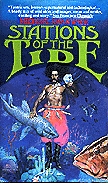
| Publisher: | Avon |
| Copyright: | 1991 |
| Printing: | March 1992 |
| ISBN: | 0-380-71524-4 |
| Format: | Mass market |
| Pages: | 252 |
The setting is the planet Miranda, a world in which land is a time-limited affair drowned beneath the ocean in a cataclysmic polar melt every two centuries. Shortly before one of those Jubilee tides, somewhere on the planet, there is a man named Gregorian, a magician who has access to restricted technology and who claims he can teach humans to transform into aquatic creatures and hence survive the tides. A bureaucrat from the Division of Technology Transfer is sent to try to retrieve the technology. But from the very start, Gregorian plays games with him, blurring the lines between technology and magic, between reality and illusion, and further complicating his search.
There's a lot going on in this book, and much of it is unstated, elliptical, or communicated only in hints. At the start it seems like we were introduced to the world, but the farther into the book one gets, the more unstated assumptions one realizes aren't valid. Sometimes this is maddening. Not all of Swanwick's rich descriptions apparently have hidden meanings, but some of them do, and the viewpoint character is just unreliable enough to not always signal the reader when something important happens. It didn't help that I mostly read this book while tired. I think to fully understand it, I'd need to immediately read it again.
Miranda is home to a rich, lush, exotic, and somewhat decadent civilization in the midst of its final death throes before the water covers it again. It's also a world with an affinity for magic (real or perceived) and hidden knowledge. If Stations of the Tide has one theme, it's secrets and limitations of knowledge. Technology is tightly controlled in this universe, and on Miranda doubly so (for reasons that make sense of huge amounts of the plot but which aren't revealed until near the end of the book). People often aren't what they seem. Facts are constantly called into question, or are shown to be simple deception. Gregorian is endlessly elusive, but is also an echo of an even more elusive species. And the bureaucrat, the viewpoint character, who just wants to resolve the problem of one piece of stolen knowledge and then get back to his job, makes his way through this shifting landscape with a plodding determination that sends eddies of unanswered questions off in all directions.
Once I got a handle on what was really going on (including some basic facts like what knowledge Gregorian stole, which turns out to be a surprisingly difficult question), I quite enjoyed this book. I'm not sure if I liked the process of getting there. There were a few too many scenes where nothing made enough sense to hold the coherency of the narrative together. Even when I could restructure all the clues backwards after knowing the final answer, many bits of the story felt gratuitously confusing. The bureaucrat makes some monumental decisions and exposes some significant deceptions at the end of the book, and I think the setup for those decisions and exposures may have been present, but the story was confusing enough that I'm not sure. Ideally, the big reveal causes the rest of the book to slowly slide into focus. In my case, it only did that in scattered pieces.
Trying to go any farther in puzzling out the deeper meanings of the book and what was truly going on would lead to significant spoilers, plus I'm not very good at this sort of analysis. If you've either read the book or don't mind spoilers, Michael Andre-Driussi has a short but fascinating analysis of the identity of the bureaucrat (never named in the book). I lean towards explanation IIA or IIB, which I missed reading the book but which make a great deal of sense in retrospect.
Another type of packing that Swanwick does here is references to other science fiction works, some of which (like the extended Pratchett nod) are delightful. Dune gets another obvious homage, as does (more loosely) Asimov's ever-present Laws of Robotics. I'm fairly certain there are others. I kept getting flickers of familiarity or deja vu while reading, but didn't pause to fully track down the reference. And even where there aren't clear specific references, Swanwick taps into much of the meme backdrop of SF: cyberspace agents whose memories one reabsorbs via the phone (one wonders if the creators of Matrix read Stations of the Tide), analogies between knowledge patterns and computer viruses that have to be contained, runaway AIs, and a bureaucracy of technology control. This is a book that is more interesting the more SF you've read and the more associations you can uncover.
This is a puzzle story that will appeal most to those who don't mind unreliable narrators and who are willing to go through large sections without understanding what's going on to get the thrill of retroactive understanding later. As a puzzle story, I think it packs together a bit much and explains not enough. There are too many events that may be thematically connected but where the connection is insufficiently clear even by the end of the book. I came away feeling like too much of the confusion was gratuitous rather than subtle. But it is a much better book than one might think from the first half. When Swanwick finally starts revealing the actual plot motivations, it acquires significant new levels of depth. I wouldn't recommend it in general, but it's a good book for those who like this style of plot development.
Reviewed: 2007-01-22